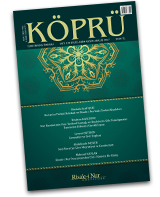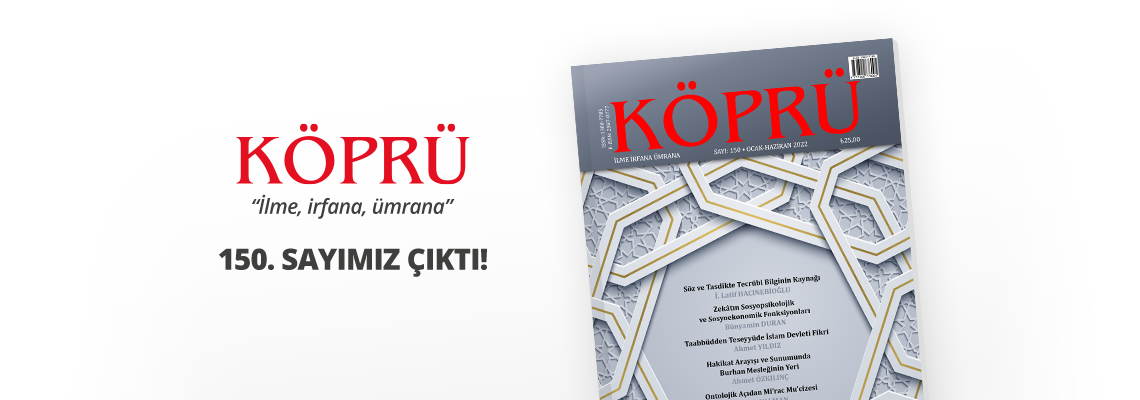Köprü Anasayfa

Eylül-Aralık 2017
"Köprü" 138. Sayı
-
Editörden
Editorial
Mehmet Kaplan
Uzm. Sosyolog, Risale-i Nur Enstitüsü
Keyfiyetli ve istifadeli çalışmalar ile yine karşınızdayız. Bu sayımızda bir farklılık yaparak belli bir kapak konusuna yoğunlaşmak yerine farklı konularda yazılmış makalelere yer verdik. Bundan sonraki süreçte de akademik formatta hazırlanan çeşitli konular üzerinde yazılmış makalelere yer vermeye devam edeceğiz.
Dergimizin hakemli makaleler bölümünde beş hakemli makale, diğer çalışmalar bölümünde ise dört makale ve bir de Köprü dergisinin olmazsa olmazlarından olan Risale-i Nur Külliyatından derleme yer almaktadır.
İlk yazımız Mustafa Said İşeri tarafından kaleme alınan “Kur’an’ın Tevhid Hakikati ve Risale-i Nur’da Tevhid Risaleleri” başlıklı yazıdır. Kur’an’ın tevhid hakikatine kavramsal ve İslam düşünce geleneği içindeki tartışmaları nazara vererek odaklanan yazı daha sonra Bediüzzaman Said Nursi’nin farklı tarihlerde telif ettiği tevhid merkezli risaleleri kısaca inceleyerek tevhide dair birbirinin tekrarı olmayan zengin bir içerik sundukları dikkatlere sunulmaktadır.
İbrahim Kaygusuz makalesinde “kök paradigmalar” üzerinden Risale-i Nur’un kitlesini tekrar nasıl inşa edeceğinin kritik bir imtihan olduğuna değinerek Nurculuk hareketinin geçirdiği kırılmalara dikkat çekmekte ve zor zamanlarda Bediüzzaman Said Nursi Olayı kitabının yazarı –yakın zamanda vefat eden– sosyolog Şerif Mardin’e atıfta bulunarak yazısını şekillendirmektedir.
“Cemaatler ve Sivil Toplum” başlıklı yazısı ile Levent Ertekin “cemaat”, “sivil toplum” vb. kavramları tanımlayarak Risale-i Nur hareketinin resmi, siyasi yapıdan uzak durduğunu ifade etmekte ve cemaatlerin sivil alanda kalması gerektiğini vurgulamaktadır.
Abdulkadir Menek, Said Nursi’nin “meşrutiyet” ve “hürriyet”e dair görüşlerini incelerken, Mahmut Kaplan ise makalesinde Risale-i Nur’daki “ehl-i sünnet”, “tasavvuf” ve “tarikat” hakkındaki tespitlere yer vermektedir.
Diğer çalışmalar bölümünde ilk yazımız Atilla Yargıcı hocamızın. Hocamız “Irkçılığın Reçetesi: Tevhid Eksenli Bilim Eğitimi ve Din” isimli makalesinde Risale-i Nur’dan hareketle ırkçılık hastalığının reçetesini sunmakta ve kardeşlik vurgusunu ön plana çıkarmaktadır. Kardeşliğin ise sloganik İslam anlayışıyla değil ancak inanç ve ahlak eksenli kardeşlik projesini hayata geçirecek bir eğitim ile mümkün olabileceğini savunmaktadır.
Taha Çağlaroğlu “İç Kanamanın Anlamı” isimli yazısında temas halinde olunan her şey –Allah unutulduğu takdirde– birlikte olunsa bile ayrılık acısının tasavvuruyla kalbi acıttığını, mülakat (görüşme/kavuşma) sırasında sevilenlerle bir aradayken başlayan “tasavvur-u zevaldeki elem” iç kanama olarak nitelendirilebilecek bir sıkıntının başlangıcını teşkil etmekte olduğunu dile getirmektedir.
Kaplan Üstüner hocamız bütün ibadetlerin ruhu olan ihlas meselesine odaklanırken,“Levent Bilgi Cemaat nedir? Ne değildir?” başlıklı yazısı ile cemaat kavramı üzerine yeniden düşünmeye davet etmektedir.
Derginin son kısmında Risale-i Nur’dan hazırladığımız seçme metinler yer almakta olup bu sayıdaki makalelerin temas ettiği bölümler ön plana çıkmaktadır. Sizi yazılarla baş başa bırakırken bir sonraki sayımızda görüşmek üzere inşaallah.
Eylül 2017
With qualified and utility works we are in the presence of you again. In this issue, we give place to articles written in different topics instead of concentrating on a specific cover, by making an alteration. Henceforwards we will continue to include articles written on various topics prepared in academic format.
In the peer-reviewed article section of our magazine there are five peer-reviewed articles, four articles in the other works section and a compilation of the Risale-i Nur Collection, which is one of the essentials of the Köprü magazine.
Our initial article is entitled “The Tawheed Truth of the Qur’an and the Tawheed Risales in the Risale-i Nur” indited by Mustafa Said İşeri. The article, which focuses on the Qur’anic tawhid truth in conceptual and controversial traditions of Islamic thought, is followed by a brief review of the tawhid-centered treatises that Bediuzzaman Said Nursi wrote in different dates and is presented with careful attention to the richness of each other’s rich, non-repetitive content.
Ibrahim Kaygusuz, in his article, draws attention to the breakages that Nurculuk movement got through, by pointing out that how to reconstruct the mass of the Risale-i Nur over “root paradigms” is a critical test and he shapes his writing by referring to sociologist Şerif Mardin -died in the near future- who is the writer of the book The Case of Bediüzzaman Said Nursi which was written in difficult times.
Levent Ertekin, with his article entitled “Communities and Civil Society”, by describing the concepts “community”, ‘civil society”, etc. expresses that the Risale-i Nur movement is far from the official, political structure and he emphasizes that the communities should remain in the civilian field.
As Abdulkadir Menek analyses Said Nursi’s views on “constitutionalism” and “liberty”, Mahmut Kaplan points out his determinations about “Ehl-i Sunnah”, “sufism” and “sect” in Risale-i Nur.
In other studies section our initial article is of our preceptor Atilla Yargıcı. Our prelector presents the prescription of racism disease with the motive of Risale-i Nur in the title of “Racism’s Prescription: Tevhid Axis Science Education and Religion” and brings brotherhood emphasis into the forefront. He argues for that The Brotherhood is possible not only with a slogan of Islamic understanding but also with a training which will realize a faithful and ethical-based brotherhood project.
Taha Çağlaroğlu in his article with the name “Meaning of Internal Bleeding” mentions that even if he is together, everything in contact –if one is unmindful of God- hurts his heart with the imagination of mental pain, is the beginning of a distress can be described as internal bleeding “imagination of mental illness” which is started when a person is with the loved ones during the interview (interview / reunion)
While our prelector Kaplan Üstüner is focusing on the issue of Ihlas, the spirit of all worship, Levent Bilgi with his “What is Community? What is not? ” entitled article, invites to rethink about the concept of the community.
In the last part of the magazine, there are selected texts prepared from Risale-i Nur and the sections come to the forefront which the articles in this issue contact. While leaving you with articles, we hope to be in the presence of you with subsequent issues.
September 2017
-
Editörden
Mehmet Kaplan
Yazıyı okumak için tıklayınız... -
Kur’an’ın Tevhid Hakikati ve Risale-i Nur’daki Tevhid Risaleleri
Mustafa Said İşeri
Yazıyı okumak için tıklayınız... -
Nur Hareketinin Yeni Tarihsel Kavşağı ve Risalelerin Kök Paradigmalar Üzerinden Kitlesini Sürekli İnşası
İbrahim Kaygusuz
Yazıyı okumak için tıklayınız... -
Cemaatler ve Sivil Toplum
Abbas Levent Ertekin
Yazıyı okumak için tıklayınız... -
Said Nursi’ye Göre Meşrutiyet ve Cumhuriyet
Abdulkadir Menek
Yazıyı okumak için tıklayınız... -
Risale-i Nur Penceresinden Ehl-i Sünnete Bir Bakış
Mahmut Kaplan
Yazıyı okumak için tıklayınız... -
Irkçılığın Reçetesi: Tevhid Eksenli Bilim Eğitimi ve Din
Atilla Yargıcı
Yazıyı okumak için tıklayınız... -
İhlas
Kaplan Üstüner
Yazıyı okumak için tıklayınız... -
İç Kanamanın Anlamı
Taha Çağlaroğlu
Yazıyı okumak için tıklayınız... -
Cemaat Nedir, Ne Değildir?
Levent Bilgi
Yazıyı okumak için tıklayınız... -
Risale-i Nur'dan Derleme
Bediüzzaman Said Nursi
Yazıyı okumak için tıklayınız...
